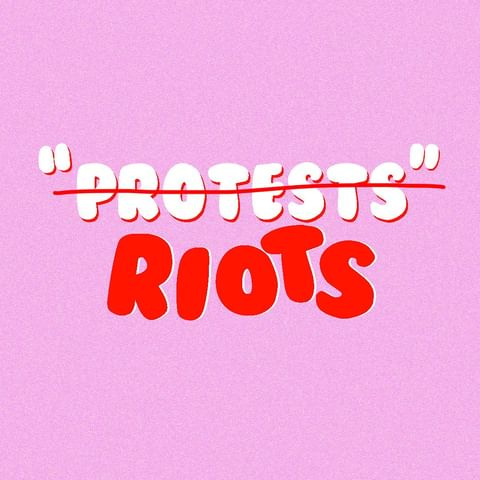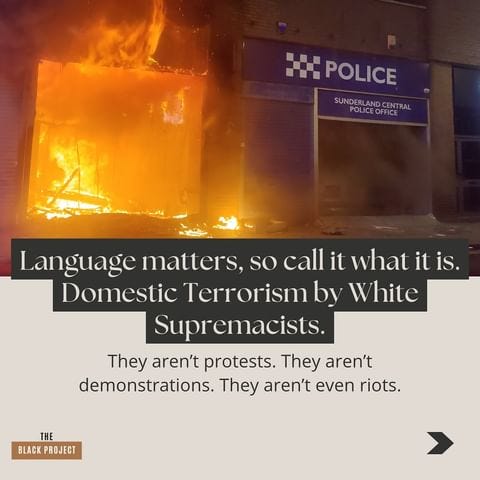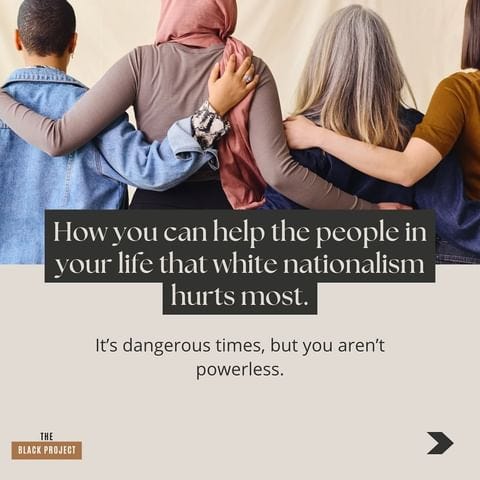Hi friends,
There’s been a recent explosion in white nationalist violence in the UK.
And yes, there’s also been a surge in people showing visible support for anti-racism.
While thousands of people have shown up to say that racism and anti-Muslim hate have no place in the UK, it’s far from over. We can’t get complacent.
There are some incredible resources out there for leaders, managers, DEI and HR folks. I’ve linked some of them in this piece.
But my focus is communications, so here are some tips to help you communicate during this upsurge in racist violence.
Call it what it is
We must call it what it is. For example:
white nationalism
white supremacist racism
anti-Muslim violence
fascism1
domestic terrorism.
It might feel easier to dance around the topic.
You might want to say “in light of what’s happened” or “recent events have been difficult” or you could just gesture wildly…
And sure, sometimes it’s helpful to be vague (like if you’re talking about a specific, horrifying event and you don’t want to trigger traumatic memories for someone who experienced it).
But we’ve got to name injustice, if we’re going to tackle it.
"Not everything that is faced can be changed, but nothing can be changed until it is faced” - James Baldwin
If you feel uncomfortable calling it domestic terrorism or white supremacy, ask yourself: why might that be? Many white people are very comfortable labelling Brown people terrorists. Make no mistake, white nationalism is terrorism.
Don’t minimise racism
A lot of news outlets are minimising the violence by:
using softening language (like “skuffles” instead of assault)
legitimising the so-called reasons for the violence (by taking time to explain the motivations or concerns of the rioters)
twisting racism and anti-Muslim hate into more positive sentiments2.
Of course, when thousands of peaceful protesters marched against the killing of (mainly) Muslim people in Palestine… that has been branded a hate movement.
For guidance on how to talk about what’s really happening, check out this excellent resource: Far right violence: a messaging guide.
Speak for the right reasons
Statements are important: they help communicate our values, show what we expect of people in our organisation, express what is unacceptable, clarify what steps we’re taking and what support is avilabable for the most affected people.
But a statement is only a tiny part of the picture.
If you’re not making sure that minoritised people can work from home or not at all, ensuring everyone has access to counselling or support spaces, or keeping minoritised people free of the emotional labour of having to advocate for anti-racism (to pick just a few examples) then don’t bother putting out a statement.
If you’re speaking out because you want to look like you’ve got the memo (racism: bad), then you haven’t actually got the memo.
Don’t distance yourself
If you’re tempted to say “we are stunned and shocked”, “this isn’t Britain” or “this is not who we are”… don’t.
Again and again, Black and Brown folks have told white people: this is the UK.
If you put out a statement expressing shock and surprise right now, you’re saying that you weren’t listening over the years as racially minoritised folks warned about the impact of the hostile environment policy, the normalisation of racism and anti-Muslim hate. Well, are you listening now?

Don’t overstate your commitment
Some organisations have put out statements that sound really powerful. They’ve said they won’t rest until they’ve dismantled white supremacy culture, racism and anti-Muslim hate.
That would be beautiful, if it was true.
But the same organisations are absolutely continuing with business as usual. They’re expecting their Brown, Black and Muslim staff to keep on working exactly as before. And tolerating discriminatory hiring, pay inequity, or saying that some issues are “political” (like talking about Palestine) and shouldn’t be talked about.
Don’t use their language
Research from public health has found that repeating myths in order to discredit them often ends up strengthening the myth.
If I tell you “don’t think about a white bear” you will think about a white bear. It’s called ironic process theory.
If I say “don’t call this anti-Muslim violence (the misleading name that people are calling it)” then you’re more likely to think about, believe and remember… the misleading name.
If possible, keep their words out of your mouth.

Know whose job this is to fix
Who’s engaging in racist anti-Muslim violence? White people.
Who’s targeting people they perceive to be migrants? White people.
Who’s job is this to fix? White people.

The people who experience this horrifying violence bear zero responsibility to fix this mess.
Take meaningful action
Asking the comms person to put out a statement isn’t taking meaningful action.
A lot of people (but very few white people 👀) have created enormously useful resources for leaders, managers, DEI and HR folks.
Use some of the phenomenal free resources available to you, like:
Hayley Bennett’s brilliant guide for allies to talk to friends and colleagues about racial injustice in the news might be helpful.
Animah Kosai’s incredible posts, which share a mixture of smaller and larger actions you can take right now to challenge racism and anti-Muslim hate.
Hannah Litt’s practical guidance for employers, DEI folks and allies on what they can do now.
Srabani Sen’s practical suggestions for what employers can do.
This guide from the Other Box: Supporting Employees of Colour During the UK Riots: 10 Key Actions for Employers.
Sunita Harley’s 10 suggested actions for meaningful anti-racism support.
Tassie Weaver’s resource sheet on how to make workforce support more trauma-informed.
I’m gathering a list of services, events and resources to support Black, Brown and Muslim folks at the moment. People are still adding to it all the time on LinkedIn, so check out the comments on the LinkedIn post to see them. I’ll then put them into a webpage to make it easier to find and share.
Understand racism
Race was invented to create racism.3
Here’s a quick summary, but if you want to learn more then read or listen to Natives: Race and class in the ruins of empire by Akala.
In the colonial Americas, a Portugese person and an Irish person would have thought of themselves as Portugese or Irish.
They wouldn’t have thought “I am white and that person is also white.” Because the shared racial identity of whiteness hadn’t been invented. (Also, whiteness is a flexible racial category that has been assigned to different groups over time).
At that time, there was no racial concept of whiteness.
But wealthy (mostly) British people were struggling with a problem.
A very small minority of wealthy landowners were trying to enslave African people, kill or dispossess Indigenous people and exploit the labour of poorer white people as indentured servants.
All the people they were trying to exploit could easily rise up and overpower this small group who were trying to hold power. How could a small minority maintain its power over the majority?
By inventing race.
destroy solidarity between poor white people, Indigenous people and enslaved African people,
give comfort to poor white people (“at least you are white”),
distract people from analysing who holds power,
divide and conquer.
It worked. Years of racist storytelling have convinced white working-class people that they have more in common with white billionaires, than with working-class Black or Brown people.
Distract, divide, conquer.

Know that racism is everywhere
People who spread racial hate are everywhere. They live in our communities. They have jobs. Even jobs that involve looking after children, like former childminder Lucy Connolly.
They are not “the other.”
If you’re reading this and thinking “nope, no racism in my lovely organisation” then er… how do I say this? You have work to do. The racism will be deep, structurally-embedded, and it will take time and effort to dismantle.
Avoid “good” and “bad”
If you’re well-meaning and left-leaning, it’s really easy to think you’re one of the good guys.
White people like me say things like: “How awful! What will these right wingers do next?” and go back to reading our Guardian long-reads about why racists are bad.
The reality is, dividing people into “good” and “bad” is unhelpful and simplistic.
And whatever communities you’re part of, you have a part to play.
Watch out for ableism
Call out racism for what it is.
You don’t need to play into harmful stereotypes about intelligence or education.
You don’t need to use slur words that have been used to oppress disabled people.
Watch out for classism
“If everyone was sophisticated enough to listen to anti-racist audiobooks, and discuss them at book club over a nice chilled white wine, then white supremacy culture would melt away. Pass the olives won’t you?” Okay, maybe that’s dripping with a bit too much sarcasm. But…
People often reduce racism down to a clash between “un-informed” working class people and “enlightened” middle and upper class people. (Grim).
Don’t fall for the classist and ableist lie that “these nasty racists are far away, they’re not in communities like our one or organisations like ours where we are soo educated and worldly.”
Focusing on white working-class men is really convenient. It erases Black and Brown people who are working-class. It erases women. It erases children who are also radicalised into extremism.
The endless focus on white working-class men also paints racism as an inevitable feature of classism. When it’s actually the opposite… racism was designed to distract us from classism.
Instead of talking about £40 billion lost to tax evaders, working-class people can believe that their public services are struggling because of people “coming over here.”4
It’s no accident that working class people are continually set up to be the foot-soldiers of white supremacy. That’s the point.
It’s no accident that working class people are continually set up to be the foot-soldiers of white supremacy. That’s the point.
Speak to your community
If you’re white, I can guarantee you’re in WhatsApp chats or social groups with people who need to learn about anti-racism.
There are people - probably tons of them - in your network that need to learn, with love and non-judgement, how to be anti-racist.
What power do you have? What spaces can you access that other people can’t? How can you share what you’re learning with them?
Donate
If you’re able to go to work and live your life right now without worrying about your safety or even your life, that is privilege.
If you can donate any amount, however small, please give to organisations that are tackling racism and anti-Muslim hate, or supporting people who experience racism. For example:
Find your community
Community is how we defeat fascism.
Community is how we defeat fascism.
I really mean it. It’s not just rhetoric.
The more we connect with each other, the more we destroy the myths that fascism thrives on.
Fascism thrives when people become disconnected from their neighbours, friends and communities. Every conversation and connection you can make can help tackle that.
The problem is not, and never was, migration.
Focus on the real problems
Instead of building homes or investing in new industries to employ the people that de-industrialisation left behind, UK leaders have waved a series of distractions at the electorate.
“Vote to leave the EU, that will bring your jobs back and pour funds back into the under-funded NHS.” (Well that went well, didn’t it?)
Stirring up hate against migrants and people who are perceived as Muslim is just another hateful distraction. A distraction from the fact that:
Our public services have been starved by decades of austerity.
More and more people can’t afford to eat, while supermarkets make record profits.
Raw sewage runs in our rivers and on our beaches, and bosses still take home bonuses.
Keep your focus laser clear. The problem is not, and never was, migration.
Show up
Showing up will be different for all of us. It might mean:
going to counter protests,
asking your Brown, Black and Muslim friends if they want you to travel with them, when they go out,
creating safe spaces or safe houses that people can go to if they’re in danger,
setting up or joining a community anti-racist neighbourhood watch,
teaching your kids about anti-racism,
committing to being an active bystander,
sharing what you learn online.
We all have a part to play. Whatever yours is, keep going.
Don’t think it’s all over
This is only the beginning.
The same media outlets that have stoked racism and anti-Muslim hate for decades, are now casually reporting on the counter protests, as though they weren’t the ones who poured petrol on the fire.
We can’t rely on the same media that stirred up these harmful stories to be the ones who save us. We have to keep showing up.
What will defeat fascism? Community.
Every conversation you have, every connection you make, can help defeat fascism.
But you have to be active.
If you have access to funds, hire and pay for professional services from experts.
If you don’t have funds you can use to pay people, then follow, learn from and celebrate folks like:
Hannah Litt (my go-to for joy, inspiration, DEI and anti-racism wisdom)
Animah Kosai (if the fire emoji was a human being: anti-oppression, joy and fierce bravery all in one)
Mehreen Ali (for wisdom, kindness and spot-on analysis of how we can tackle Islamophobia and injustice at work)
Anita Phagura (Anita’s focused on DEI in construction, and shares razor sharp analysis and practical guidance on how we can all tackle racism and other -isms),
Rahimeh Ramezany (I particularly recommend Rahimeh’s amazing TikToks)
Nova Reid (you can buy her book The Good Ally and sign up for Nova Reid’s anti-racism course )
Collette Philip (the anti-racist brand queen: follow Collette on social media, get her e-book, work with her anti-racist brand consultancy Brand By Me),
Abi Adamson (a brilliant anti-racism and DEI educator)
Natalie Evans (anti-racism educator, writer and speaker, author of 'The Mixed-Race Experience', 'Everyday Action, Everyday Change' and co-founder of Everyday Racism UK)
Sharon Hurley Hall (who writes one of my favourite resources in the world: Sharon’s anti-racism newsletter)
Regina Jackson and Saira Rao (anti-racism campaigners and co-creators of Race2Dinner).
John Amaechi (who has some brilliant resources, like this short video on the difference between being racist and anti-racist).
Find joy
As wise folks like Hannah Litt, Animah Kosai, adrienne maree brown and others say so beautifully: we need to centre joy in our protest movements.
It’s my birthday today. I wasn’t sure whether to spend today and yesterday writing this. Should I take the day off for my birthday? Is it work that I need to be “off” from?
Or is it an outpouring of love and joy? I choose to see this as a work of love and joy.
The definition of fascism I often come back to is from Shane Burley who writes: “fascism is a set of political practices fundamentally based in upholding rigid, identity-based hierarchies. These hierarchies manifest as forms of supremacy depending on the country and cultural context. For example, fascist movements can be white supremacist, nativist, male supremacist, Christian supremacist, and more. Under fascism, the majority sees itself as a victimized community that’s fighting against marginalized communities for its survival. Within the U.S., fascists have convinced themselves that immigrants, Trans people, Black people, and many more marginalized communities are working to eradicate their way of life. In order to maintain their position, fascists believe in “purifying” society of the communities they see as undesirable to maintain the status of their conception of the “master race.” Fascists believe that democracy has failed them and allowed the majority (in the U.S., white Christian men) to be tyrannized by communities that have no right to power. Therefore, fascists seek to eliminate both democratic processes and marginalized communities to return to an often fictitious and glorified past where their power reigned unchecked.”
For example, calling it “patriotism” which many people think is a positive trait.
Race was invented, and with it scientific racism (the belief that there are differences between people of different racial backgrounds, which explain their abilities, their access to resources like money and rights like safety). There is no biological basis at all for what we call race.
On this idea of migrants “coming over here”, let’s get accurate for a moment. As Ambalavaner Sivanandan said: “We are here because you were there.” Or as a recent campaign re-imagined it: “We did not come to Britain. Britain came to us.”















Brilliant, Ettie. This is an amazing collection of resources! I'm bookmarking it for future reference. Thank you!
Ettie, this is a rich and beautifully clear resource for anyone who has been "shocked and appalled" by the racist violence in the UK. Because aa we know, the condemnation and shock is not enough and doesn't drive the change we need to see. But this brilliant article will take someone from passive bystander to active solidarity! Thank you ❤️